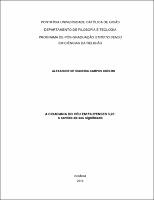| Compartilhamento |


|
Use este identificador para citar ou linkar para este item:
http://tede2.pucgoias.edu.br:8080/handle/tede/862Registro completo de metadados
| Campo DC | Valor | Idioma |
|---|---|---|
| dc.creator | Coelho, Alexandre de Siqueira Campos | - |
| dc.creator.Lattes | http://lattes.cnpq.br/1703784649160833 | por |
| dc.contributor.advisor1 | Ferreira, Joel Antônio | - |
| dc.contributor.advisor1Lattes | http://buscatextual.cnpq.br/buscatextual/visualizacv.do?id=K4700383Z6 | por |
| dc.contributor.referee1 | Silva, Valmor da | - |
| dc.contributor.referee1Lattes | http://buscatextual.cnpq.br/buscatextual/visualizacv.do?id=K4708687A0 | por |
| dc.contributor.referee2 | Sassatelli, Pietro | - |
| dc.date.accessioned | 2016-07-27T13:48:23Z | - |
| dc.date.available | 2013-12-17 | - |
| dc.date.issued | 2013-08-28 | - |
| dc.identifier.citation | COELHO, Alexandre de Siqueira Campos. Heavenly Citizenship in Philippians 3:20: the sense of its meaning.. 2013. 158 f. Dissertação (Mestrado em Ciências Humanas) - Pontifícia Universidade Católica de Goiás, GOIÂNIA, 2013. | por |
| dc.identifier.uri | http://localhost:8080/tede/handle/tede/862 | - |
| dc.description.resumo | Este trabalho tem o fito de trazer à tona o conteúdo substancial que a expressão cidadania do céu carrega consigo. Para tanto, a partir da reconstituição histórica do sitz im leben (ambiente vital) da carta do apóstolo Paulo aos cristãos da igreja que ele mesmo fundara (e a qual tanto se afeiçoou) em Filipos, perpassa o debate a respeito das circunstâncias em que essa carta foi escrita, para, então, entender o porquê de Paulo ter se utilizado do termo cidadania para captar a atenção dos seus destinatários. Em seguida, minuciando o texto bíblico no seu original grego, procede à exegese da perícope em que inserida a expressão em torno da qual gira a pesquisa cidadania do céu para, dele extrair as amarras (limites) que margearão a interpretação baseada na hermenêutica paulina. No último capítulo, sem deixar de levar em conta a informalidade e as várias expressões coloquiais que marcam Filipenses, apresenta-se as correntes interpretativas de 3,20, a fim de cotejá-las com o possível sentido do significado de cidadania do céu . Conclui-se que a referida expressão não foi utilizada no sentido que lhe era comum nos mundos grego (ativa participação política) ou romano (qualidade de súdito). Ela busca, isso sim, reforçar a identidade da comunidade (e não a dos inimigos da cruz) a partir do arquétipo de Cristo, tornando-se o centro da fé cristã. | por |
| dc.description.abstract | This dissertation is concerned with what the substantial content that the expression heavenly citizenship brings within itself. To accomplish this, the study starts from the historical reconstitution of the Sitz im Leben (life setting) that the apostle Paul s letter to the Christians in the church which he founded (and of which he was so attached to) in Philippi and then explains in what circumstances this letter was written, so to understand the reason Paul used the term citizenship capturing the attention of his readers. The study then details the biblical text in its original greek and does an exegesis of the passage inserted into its original language, where this study focuses its main research citizenship of heaven and from this definition defines the margins that bound the interpretation based on Pauline hermeneutics. In the last chapter, without taking into consideration the informality of various colloquial expressions that mark Philippians, this study presents the interpretive variations of 3:20, so one can have a possible interpretation of the meaning heavenly citizenship . Careful examination infers that the expression was not used in the sense that the common greek world (active political participation) our roman world (quality of the subject) would have used it. The specific term seeks to reinforce the community (and not the enemies of the cross) starting from the archetype of Christ and later becoming the center of the Christian faith. | eng |
| dc.description.provenance | Made available in DSpace on 2016-07-27T13:48:23Z (GMT). No. of bitstreams: 1 ALEXANDRE DE SIQUEIRA CAMPOS COELHO.pdf: 2192441 bytes, checksum: 30931ddd49e5f9d65712b5e22d2884b0 (MD5) Previous issue date: 2013-08-28 | eng |
| dc.format | application/pdf | por |
| dc.thumbnail.url | http://localhost:8080/tede/retrieve/3714/ALEXANDRE%20DE%20SIQUEIRA%20CAMPOS%20COELHO.pdf.jpg | * |
| dc.language | por | por |
| dc.publisher | Pontifícia Universidade Católica de Goiás | por |
| dc.publisher.department | Ciências Humanas | por |
| dc.publisher.country | BR | por |
| dc.publisher.initials | PUC Goiás | por |
| dc.publisher.program | Ciências da Religião | por |
| dc.rights | Acesso Aberto | por |
| dc.subject | cidadania do céu | por |
| dc.subject | Filipenses 3,20 | por |
| dc.subject | identidade | por |
| dc.subject | imitação | por |
| dc.subject | comunhão | por |
| dc.subject | heavenly citizenship | eng |
| dc.subject | Philippians 3:20 | eng |
| dc.subject | identity | eng |
| dc.subject | imitation | eng |
| dc.subject | communion | eng |
| dc.subject.cnpq | CNPQ::CIENCIAS HUMANAS::TEOLOGIA | por |
| dc.title | A CIDADANIA DO CÉU EM FILIPENSES 3,20: o sentido do seu significado. | por |
| dc.title.alternative | Heavenly Citizenship in Philippians 3:20: the sense of its meaning. | eng |
| dc.type | Dissertação | por |
| Aparece nas coleções: | Mestrado em Ciências da Religião | |
Arquivos associados a este item:
| Arquivo | Descrição | Tamanho | Formato | |
|---|---|---|---|---|
| ALEXANDRE DE SIQUEIRA CAMPOS COELHO.pdf | 2,14 MB | Adobe PDF |  Baixar/Abrir Pré-Visualizar |
Os itens no repositório estão protegidos por copyright, com todos os direitos reservados, salvo quando é indicado o contrário.




